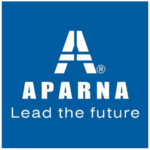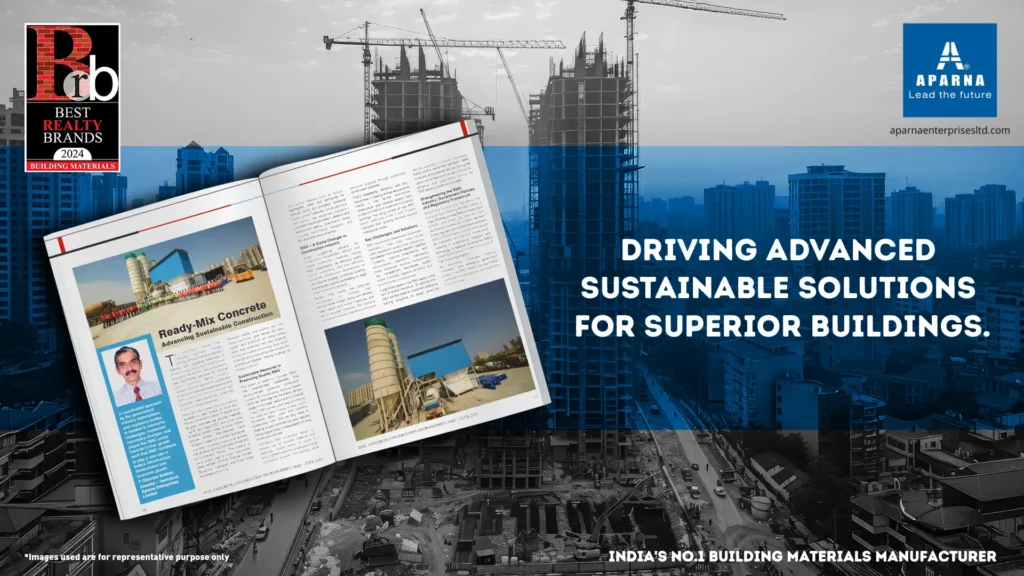Ready-Mix Concrete Advancing Sustainable Construction
A coordinated approach by the government, industry stakeholders, and regulatory bodies is needed to overcome challenges, implement necessary changes, and propel the RMC sector towards further growth such that RMC continues to play a vital role in India’s infrastructure development and economic growth.
T Chandra Sekhar, Director-Technical, Aparna Enterprises Limited
The construction industry has undergone significant changes recently, shifting towards sustainable materials. With increasing awareness of climate change and environmental issues, consumers, developers, and policymakers seek eco-friendly solutions to minimise carbon footprints. Market research indicates that the demand for sustainable construction materials is expected to exceed $365 billion by 2027 due to enhanced legal provisions, health-conscious customers, and environmental awareness.
Advancements in green building materials represent a leap toward a more eco-friendly construction sector. Products such as green concrete use recycled materials like fly ash, slag/GGBS, and silica fume to reduce cement usage, a known carbon dioxide emitter. Manufactured Sand (M-Sand), made from crushed hard stones, is another innovative product that replaces natural sand, proving both economical and environmentally friendly. This product is being widely used in Indian metropolitan cities like Delhi, Mumbai, Chennai, Kolkata, Bangalore, Hyderabad, and Pune, where real estate is booming
Recycled metals and plastics are now being commonly used. Metals like steel, copper, and aluminium are being melted down and re-formed into new products, saving raw materials and energy. Solar-active buildings are incorporating solar panels into architectural facades, making buildings net energy producers.
Sustainable Measures in Producing Quality RMC
The advent of ready-mix concrete (RMC) has revolutionised sustainable and environmentally conscious construction projects. By incorporating industrial wastes like fly ash and slag into the blend, cement usage is minimized, reducing environmental impact. RMC comes pre-mixed, eliminating the need for extra mixing on-site, which decreases labour costs and shortens construction time. This not only helps in meeting project timelines but also reduces the ecological footprint associated with long construction periods.
Centralised RMC production allows for the efficient use of recycled materials and resources. Quality control is crucial to ensuring RMC meets the challenges of large commercial projects. The process starts with testing materials such as cement, aggregates, water, and admixtures for strength, purity, and gradation. Additional quality control measures include plant and field control, new equipment evaluation, concrete mixture optimisation, research and development testing, specification review, concrete performance evaluation, and failure analysis and prevention.
RMC – A Game Changer in Construction Industry
India’s burgeoning demand for infrastructure necessitates efficient and reliable construction materials, making RMC indispensable. Its efficiency, quality control, consistency, and time efficiency accelerate infrastructure development. Its use reduces wastage, enhances durability, and ensures superior consistency in large-scale construction projects.
Modern RMC plants use advanced technologies to minimise their environmental impact, along with efficient water usage, dust control measures, and the use of recycled materials. This supports India’s environmental objectives and fosters economic progress through sustainable construction practices.
RMC’s adaptability, efficiency, and eco-friendliness in meeting diverse requirements make it vital across commercial, infrastructure, and industrial sectors, from bridges and dams to roads and multi-storey buildings. The rising number of new RMC plants, particularly in tier II and III cities, highlights their growing demand beyond metropolitan areas.
Key Challenges and Solutions
RMC manufacturers face several challenges, especially in metro cities. These include traffic regulations, supply chain disruptions, competition from smaller players, logistical limitations, machine breakdowns, and environmental regulations. Addressing these challenges requires implementing risk management techniques, quality control practices, logistical efficiency, and environmental consciousness.
A significant issue in the RMC sector is the lack of skilled manpower. To address this, plant owners need to implement extensive training programs to equip personnel with expertise in concrete technology, quality control, equipment operation, safety protocols, and customer service. Skilling the personnel will lead to enhanced productivity, efficiency, and sustainability, driving the RMC sector’s growth and success.
Strengthening the RMC Industry: Government Policies and Regulatory Framework
Government policies and regulations play a crucial role in shaping the RMC sector in India. Efforts to promote RMC in infrastructure projects and smart city missions have significantly boosted the industry. However, further regulatory amendments are needed to simplify the framework, provide financial and tax incentives, and improve infrastructure. Investing in sustainability, research, and technology is essential to enhance RMC’s longevity and ensure a continuous supply of high-quality aggregates.
By addressing challenges, fostering innovation, and leveraging government support, the RMC industry can significantly contribute to a prosperous and sustainable future for India

